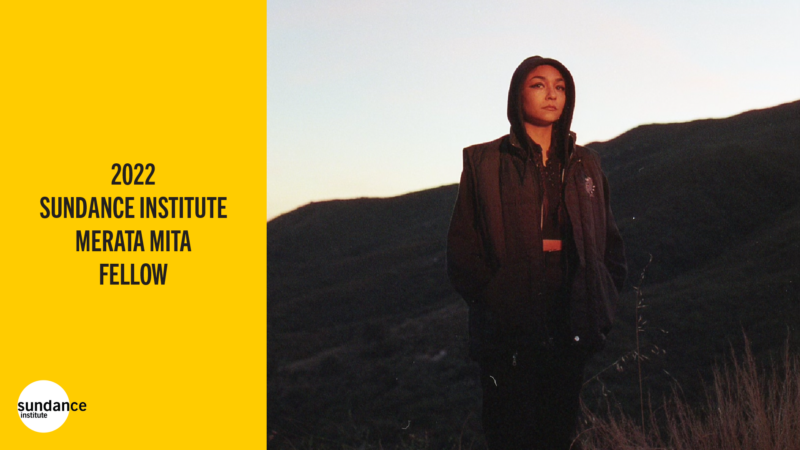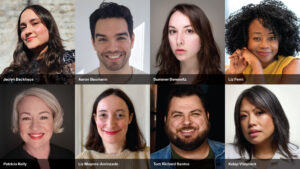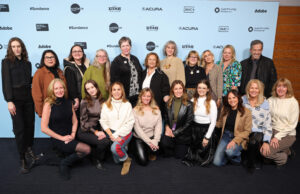Seventh Year of Fellowship Honors Artistic Contributions of Late Māori Filmmaker
Park City, UT — Sundance Institute announced today the recipient of the 2022 Merata Mita Fellowship, an annual fellowship named in honor of the late Māori filmmaker Merata Mita (1942-2010) designed for Indigenous women-identified artists who are striving to direct a feature film. This year’s Fellow, Fox Maxy (Payómkawichum and Mesa Grande Band of Mission Indians) was recognized at the Native Forum Celebration on The Spaceship in the Festival Online Platform during the 2022 Sundance Film Festival.
The Native Forum Celebration featured an opening blessing by Bart Powakee and the Red Spirit Singers from the Ute Tribal Nation and remarks from newly appointed Sundance Institute CEO Joana Vicente, Sundance Institute Board member Amy Redford, Nia Tero (represented by Tracy Rector), Jennifer Loren from the Cherokee Nation Film Office, and Indigenous Program Interim Director Adam Piron (Kiowa and Mohawk). Piron also announced the 2021 Native Lab Fellows and Artists-in-Residence and acknowledged the nine Indigenous-made projects from around the world that are premiering at the 2022 Sundance Film Festival from January 20-30.
Merata Mita (Ngāi Te Rangi/Ngāti Pikiao) was one of the first Māori women to write and direct a dramatic feature film. She served as an advisor and artistic director of the Sundance Institute Native Lab from 2000 to 2009, where she championed emerging Indigenous talent. In continuation of her legacy, the Sundance Institute is in its seventh year of awarding a fellowship in her name to an Indigenous woman-identified filmmaker from a global applicant pool. The Fellowship includes a cash grantand yearlong support with activities, including attendance at the Sundance Film Festival, access to strategic and creative services offered by Sundance Institute’s artist programs, and mentorship opportunities.
Fox Maxy is a filmmaker and artist based in San Diego, CA. Her work has screened at BAM CinemaFest, International Film Festival Rotterdam (IFFR), imagineNATIVE Festival, MoMAs Doc Fortnight, LACMA, AFI Docs and Camden International Film Festival among other places. Maxy’s first feature film, Watertight, is “a collection of interviews about mental health and suicide, interrupted by fake commercials, reality tv parodies, animations and archival footage. Watertight flips through channels, traveling around Indian country and big cities, following people who create their own realities.”
“Gathering each year to celebrate the memory of our Sundance Institute colleague Merata Mita in this way is so rewarding as she was the first Indigenous woman to solely write, direct and produce a dramatic feature film — it’s only right to pass on that torch every year by providing resources and support to one of the many Indigenous women-identified filmmakers she has inspired globally,” said Adam Piron. “We’re in a moment where more Indigenous artists are telling their stories to a wider-reaching audience than ever before. However, the work of indigenizing the moving image is ongoing and, like Merata, we remain committed to contributing to that work in practical ways that build community and uplift Indigenous voices.”
“This opportunity feels like the biggest prize from the craziest game and it came at a time when I’m finally not scared of anything,” said Maxy. “I’ve been filming, taking photos and making collages with sounds or visuals since a very young age. I film every day, but it took me over a decade to put myself out there.”
“It takes guts to be vulnerable and pour your real emotions into a project, and there’s no guarantee that anyone will care,” Maxy continued. “When I heard that I received this fellowship, I cried. This means that my voice in my work is actually reaching people and I’m being heard. I’m grateful to the entire Sundance team. Our talks keep me calm. It’s like having a group of friends and mentors who are rooting for me to do what I want — they encourage me to carve my own rules and set out on my own path.”
Supporting self-determination in storytelling for Indigenous filmmakers and decolonizing the screen has always figured prominently at Sundance Institute. Native American filmmakers were invited to participate in the founding meetings of Sundance Institute and its first filmmaking Lab in 1981, and the Institute’s Feature Film Program, Documentary Film Program, and Sundance Film Festival conduct ongoing outreach to Indigenous artists and collaborate with the Indigenous Program to identify artists for support across the globe. Last year’s Merata Mita fellow, Marja Bål Nango, just attended the Sundance Feature Film Program’s January 2022 Screenwriters Lab.
Sundance Institute’s Indigenous Program
The Sundance Institute Indigenous Program is supported by The Andrew W. Mellon Foundation, W.K. Kellogg Foundation, John D. and Catherine T. MacArthur Foundation, WarnerMedia,, Nia Tero Foundation, Indigenous Screen Office, SAGindie, New Zealand Film Commission, Jenifer and Jeffrey Westphal, Susan Friedenberg, Susan Shilliday, Indigenous Media Initiatives, Exposure Labs, Chelsea Winstanley, Felix Culpa, N. Bird Runningwater, Sterlin Harjo, and Sarah Luther.
The Sundance Film Festival
The Sundance Film Festival has introduced global audiences to some of the most groundbreaking films of the past three decades, including Flee, CODA, Passing, Summer Of Soul (…or, When the Revolution Could Not Be Televised), Clemency, Never Rarely Sometimes Always, Zola, On The Record, Boys State, The Farewell, Honeyland, One Child Nation, The Souvenir, The Infiltrators, Sorry to Bother You, Won’t You Be My Neighbor?, Hereditary, Call Me By Your Name, Get Out, The Big Sick, Mudbound, Fruitvale Station, Whiplash, Brooklyn, Precious, The Cove, Little Miss Sunshine, An Inconvenient Truth, Napoleon Dynamite, Hedwig and the Angry Inch, Reservoir Dogs and sex, lies, and videotape.
The Festival is a program of the non-profit Sundance Institute. 2022 Festival sponsors include: Presenting Sponsors – Acura, AMC+, Chase Sapphire, Adobe; Leadership Sponsors – Amazon Studios, DIRECTV, DoorDash, Dropbox, Netflix, Omnicom Group, WarnerMedia, XRM Media; Sustaining Sponsors – Aflac, Audible, Canada Goose, Canon U.S.A., Inc., Dell Technologies, IMDbPro, Michelob ULTRA Pure Gold, Rabbit Hole Bourbon & Rye, Unity Technologies, University of Utah Health, White Claw Hard Seltzer; Media Sponsors – The Atlantic, IndieWire, Los Angeles Times, NPR, Shadow And Act, Variety, Vulture. Sundance Institute recognizes critical support from the State of Utah as Festival Host State. The support of these organizations helps offset the Festival’s costs and sustain the Institute’s year-round programs for independent artists. sundance.org/festival
Sundance Institute
As a champion and curator of independent stories for the stage and screen, Sundance Institute provides and preserves the space for artists in film, theatre, film composing, and digital media to create and thrive.
Founded in 1981 by Robert Redford, the Institute’s signature Labs, granting, and mentorship programs, dedicated to developing new work, take place throughout the year in the U.S. and internationally. Sundance Collab, a digital community platform, brings artists together to learn from each other and Sundance advisors and connect in a creative space, developing and sharing works in progress. The Sundance Film Festival and other public programs connect audiences and artists to ignite new ideas, discover original voices, and build a community dedicated to independent storytelling. Sundance Institute has supported such projects as Clemency, Never Rarely Sometimes Always, Zola, On The Record, Boys State, The Farewell, Honeyland, One Child Nation, The Souvenir, The Infiltrators, Sorry to Bother You, Won’t You Be My Neighbor?, Hereditary, Call Me By Your Name, Get Out, The Big Sick, Mudbound, Fruitvale Station, City So Real, Top of the Lake, Between the World & Me, Wild Goose Dreams and Fun Home. Join the Sundance Institute on Facebook, Instagram, Twitter and YouTube.




